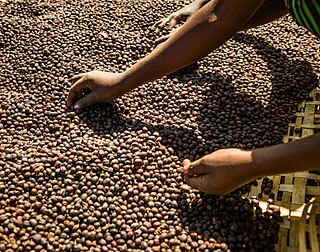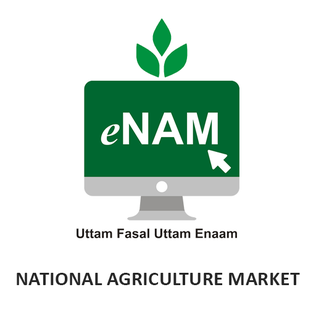Related Research Articles

Fair trade is a term for an arrangement designed to help producers in developing countries achieve sustainable and equitable trade relationships. The fair trade movement combines the payment of higher prices to exporters with improved social and environmental standards. The movement focuses in particular on commodities, or products that are typically exported from developing countries to developed countries but is also used in domestic markets, most notably for handicrafts, coffee, cocoa, wine, sugar, fruit, flowers and gold.

The Nairobi Securities Exchange (NSE) was established in 1954 as the Nairobi Stock Exchange, based in Nairobi the capital of Kenya. It was a voluntary association of stockbrokers in the European community registered under the Societies Act in British Kenya. The exchange had 66 listed companies in February 2021.
Coffee production is a significant contributor to the economy of Kenya. The industry is noted for its cooperative system of production, processing, milling, marketing, and auction system. About 70% of Kenyan coffee is produced in small farms that control about 75% of the land under production. It was estimated in 2012 that there were about 150,000 coffee farmers in Kenya. Other sources suggest that 6 million Kenyans are employed directly or indirectly in the coffee industry.
Mumias Sugar Company Limited is a sugar manufacturing company in Kenya, the largest economy in the East African Community. It is the largest sugar manufacturer in Kenya, producing about 250,000 metric tonnes (42%) of the estimated 600,000 metric tonnes annual national output.
The Oromia Coffee Farmers’ Cooperative Union (OCFCU) is a smallholder farmer-owned cooperative union based in the Oromia region of Ethiopia. The aforementioned region is characterized by its unique native vegetation and tropical climate conducive to coffee bean growth. OCFCU is a democratic, member-owned business operating under the principles of the International Cooperative Alliance and Fair trade, and the Union plays a central role in the Ethiopian coffee marketing chain. The members of OCFCU grow, process, and supply organic Arabica coffee for export.

Indonesia was the fourth-largest producer of coffee in the world in 2014. Coffee cultivation in Indonesia began in the late 1600s and early 1700s, in the early Dutch colonial period, and has played an important part in the growth of the country. Indonesia is geographically and climatologically well-suited for coffee plantations, near the equator and with numerous interior mountainous regions on its main islands, creating well-suited microclimates for the growth and production of coffee.
Market information systems are information systems used in gathering, analyzing and disseminating information about prices and other information relevant to farmers, animal rearers, traders, processors and others involved in handling agricultural products. Market information systems play an important role in agro-industrialisation and food supply chains. With the advance of information and communication technologies for development (ICTs) in developing countries, the income- generation opportunities offered by market information systems have been sought by international development organizations, non-governmental organizations (NGOs) and businesses alike.

Fair trade coffee is coffee that is certified as having been produced to fair trade standards by fair trade organizations, which create trading partnerships that are based on dialogue, transparency and respect, with the goal of achieving greater equity in international trade. These partnerships contribute to sustainable development by offering better trading conditions to coffee bean farmers. Fair trade organizations support producers and sustainable environmental farming practices and prohibit child labor or forced labor.

Coffee production in Ethiopia is a longstanding tradition which dates back dozens of centuries. Ethiopia is where Coffea arabica, the coffee plant, originates. The plant is now grown in various parts of the world; Ethiopia itself accounts for around 17% of the global coffee market. Coffee is important to the economy of Ethiopia; around 30-35% of foreign income comes from coffee, with an estimated 15 million of the population relying on some aspect of coffee production for their livelihood. In 2013, coffee exports brought in $300 million, equivalent to 24% of that year's total exports.
Tea is a major cash crop that is grown in Kenya. Kenyan tea has been the leading major foreign exchange earner for the country.

Coffee production in Tanzania is a significant aspect of its economy as it is Tanzania's largest export crop. Tanzanian coffee production averages between 30,000 and 40,000 metric tons annually of which approximately 70% is Arabica and 30% is Robusta.

Coffee is Uganda's top-earning export crop. In 1989 Uganda's coffee production capacity exceeded its quota of 2.3 million bags, but export volumes were still diminished by economic and security problems, and large amounts of coffee beans were still being smuggled out of Uganda for sale in neighbouring countries. Uganda is one of the few countries in the world with indigenous coffee, with Robusta coffee growing wild around Lake Victoria.
The East Africa Exchange (EAX), also, East African Commodity Exchange, is a privately funded regional, agricultural commodities exchange in East Africa. It was launched in Kigali, Rwanda, in July 2014. EAX is the third-largest agricultural commodities exchange in Africa, behind the South African Futures Exchange and the Ethiopia Commodity Exchange.
The Uganda Coffee Development Authority (UCDA) is a government agency mandated to "regulate, promote and oversee the quality of coffee along the entire value chain, support research and development, promote production, and improve the marketing of coffee in order to optimize foreign exchange earnings for the country and payments to the farmers.

National Agriculture Market or eNAM is an online trading platform for agricultural commodities in India. The market facilitates farmers, traders and buyers with online trading in commodities.

Tanzania Mercantile Exchange is a commodity exchange in Tanzania. The commodities exchange is put in place to help various farmers access the domestic and global market better and obtain a fair price in selling of their produce. The exchange is currently undergoing training of their staff and is and has begun pilot trading in Sesame Seeds and Green Grams. The exchange plans to trade in coffee, cashew nuts, sesame, rice, sunflowers and maize, which are all currently traded under the warehouse receipt system. The Capital Market and Securities Authority (CMSA) currently oversees the operations of the exchange and is in the process of educating farmers to use the system, however, many farmers are skeptical to the system.
Modern cultivation of coffee in China began in 1988. In 2016 and 2017, China was among the top 20 worldwide producers of coffee. Ninety-eight per cent of the coffee grown in China comes from Yunnan province.

Selina Wamucii is an agricultural company and social enterprise that markets produce from smallholder farmers by integrating with cooperatives, producer organizations, agro-processors, small and medium enterprises, and other organizations that work directly with family farmers. It uses technology to manage the produce grown by smallholder farmers. The company's headquarters are located in Nairobi and is best known as Kenya's largest exporter of avocado.
Benguet coffee, also known as Benguet arabica, is a single-origin coffee varietal grown in the Cordillera highlands of the northern Philippines since the 19th century. It belongs to the species Coffea arabica, of the Typica variety. It is one of the main crops of farmers in the province of Benguet, which has a climate highly suitable for arabica cultivation. Benguet coffee is listed in the Ark of Taste international catalogue of endangered heritage foods by the Slow Food movement.
Rashtriya e-Market Services (ReMS) is established as a joint venture of Government of Karnataka (India) and NCDEX spot exchange limited with equal shareholding. It was conceived to blend public interest with the initiative of a private enterprise for establishing, operating, managing a specialized electronic trading platform called Unified Market Platform (UMP) for auctioning of farmer's produce. Department of Agricultural Marketing, ReMS and the Markets, work in close coordination to implement the reforms agenda of the State. ReMS has been striving to put in to place the best practices in the agricultural markets like Establishing Assaying facilities, cleaning and grading machinery in markets, capacity building for stakeholders etc.
References
- ↑ Kornman, Chris (2018-06-25). "Auctioning Coffees at Origin: Kenya's Coffee Exchange". Daily Coffee News by Roast Magazine. Retrieved 2024-01-26.
- ↑ "The Coffee Industry in Kenya". Embassy of Kenya in Japan.
- ↑ Nyawira, Susan (2023-01-20). "CMA extends approval to the Nairobi Coffee Exchange". Capital Business. Retrieved 2024-01-26.
- ↑ Mwita, Martin. "Boon for coffee farmers as Nairobi auction resumes". The Star. Retrieved 2024-01-26.
- ↑ Kamunde, Muraya (2023-08-15). "Gachagua to preside over re-opening of Nairobi Coffee Exchange Auction". KBC. Retrieved 2024-01-26.
- ↑ "Nairobi Coffee Exchange Reopens To Empower Farmers, Lock-out Cartels – Rural Times News" . Retrieved 2024-01-26.
- ↑ "Coffee auction remains suspended for third week, farmers hit". Nation. 2023-07-20. Retrieved 2024-01-26.
- ↑ "ORIGIN: KENYA the showcase coffees of the coffee industry". Quantum Coffee Roasters. 2020-09-20. Retrieved 2024-02-07.
- 1 2 Mwangi, George (Nov 24, 2023). "Kenya to Offer 771 Tons of Arabica Coffee at Auction". Barron's. Dow Jones Newswires. Retrieved Feb 7, 2024.
- 1 2 "Kenya's traded coffee volumes, prices rebound on participants' return". The East African. 2024-01-13. Retrieved 2024-01-26.
- ↑ "Chaos as coffee auction shut for fourth week in row". Nation. 2023-07-28. Retrieved 2024-01-26.